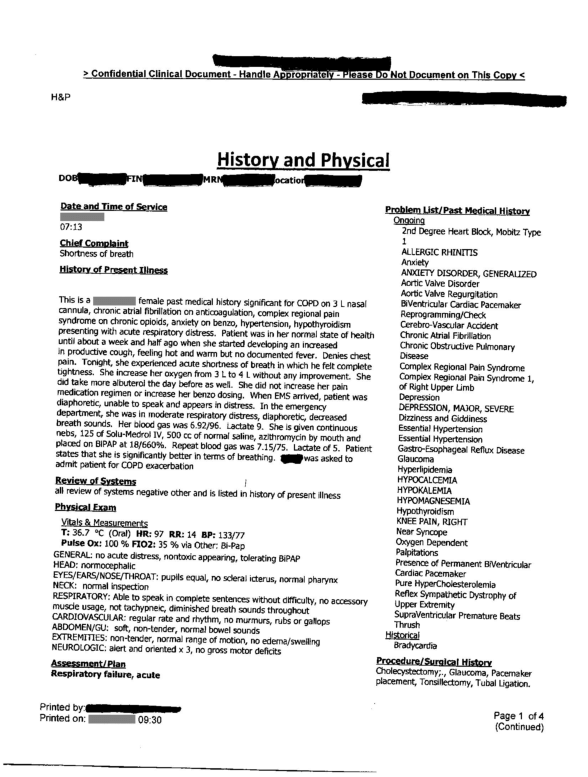Description
Deidentification NER (Large) is a Named Entity Recognition model that annotates text to find protected health information that may need to be deidentified. The entities it annotates are Age, Contact, Date, Id, Location, Name, and Profession. This model is trained with the embeddings_clinical word embeddings model, so be sure to use the same embeddings in the pipeline.
It protects specific health information that could identify living or deceased individuals. The rule preserves patient confidentiality without affecting the values and the information that could be needed for different research purposes.
Predicted Entities
NAME, AGE, CONTACT, LOCATION, PROFESSION, PERSON, DATE.
Live Demo Open in Colab Copy S3 URI
How to use
def deidentification_nlp_pipeline(input_column, prefix = ""):
document_assembler = DocumentAssembler() \
.setInputCol(input_column) \
.setOutputCol(prefix + "document")
# Sentence Detector annotator, processes various sentences per line
sentence_detector = SentenceDetector() \
.setInputCols([prefix + "document"]) \
.setOutputCol(prefix + "sentence")
tokenizer = Tokenizer() \
.setInputCols([prefix + "sentence"]) \
.setOutputCol(prefix + "token")
# Clinical word embeddings
word_embeddings = WordEmbeddingsModel.pretrained("embeddings_clinical", "en", "clinical/models") \
.setInputCols([prefix + "sentence", prefix + "token"]) \
.setOutputCol(prefix + "embeddings")
# NER model trained on i2b2 (sampled from MIMIC) dataset
clinical_ner = MedicalNerModel.pretrained("ner_deid_large", "en", "clinical/models") \
.setInputCols([prefix + "sentence", prefix + "token", prefix + "embeddings"]) \
.setOutputCol(prefix + "ner")
custom_ner_converter = NerConverter() \
.setInputCols([prefix + "sentence", prefix + "token", prefix + "ner"]) \
.setOutputCol(prefix + "ner_chunk") \
.setWhiteList(["NAME", "AGE", "CONTACT", "LOCATION", "PROFESSION", "PERSON", "DATE"])
nlp_pipeline = Pipeline(stages=[
document_assembler,
sentence_detector,
tokenizer,
word_embeddings,
clinical_ner,
custom_ner_converter
])
empty_data = spark.createDataFrame([[""]]).toDF(input_column)
nlp_model = nlp_pipeline.fit(empty_data)
return nlp_model
# Convert to images
binary_to_image = BinaryToImage() \
.setInputCol("content") \
.setOutputCol("image_raw")
# Extract text from image
ocr = ImageToText() \
.setInputCol("image_raw") \
.setOutputCol("text") \
.setIgnoreResolution(False) \
.setPageIteratorLevel(PageIteratorLevel.SYMBOL) \
.setPageSegMode(PageSegmentationMode.SPARSE_TEXT) \
.setConfidenceThreshold(70)
# Found coordinates of sensitive data
position_finder = PositionFinder() \
.setInputCols("ner_chunk") \
.setOutputCol("coordinates") \
.setPageMatrixCol("positions") \
.setMatchingWindow(1000) \
.setPadding(1)
# Draw filled rectangle for hide sensitive data
drawRegions = ImageDrawRegions() \
.setInputCol("image_raw") \
.setInputRegionsCol("coordinates") \
.setOutputCol("image_with_regions") \
.setFilledRect(True) \
.setRectColor(Color.gray)
# OCR pipeline
pipeline = Pipeline(stages=[
binary_to_image,
ocr,
deidentification_nlp_pipeline(input_column="text"),
position_finder,
drawRegions
])
image_path = pkg_resources.resource_filename("sparkocr", "resources/ocr/images/p1.jpg")
image_df = spark.read.format("binaryFile").load(image_path)
result = pipeline.fit(image_df).transform(image_df).cache()
def deidentification_nlp_pipeline(input_column, prefix = ""):
val document_assembler = new DocumentAssembler()
.setInputCol(input_column)
.setOutputCol(prefix + "document")
# Sentence Detector annotator, processes various sentences per line
val sentence_detector = new SentenceDetector()
.setInputCols(Array(prefix + "document"))
.setOutputCol(prefix + "sentence")
val tokenizer = new Tokenizer()
.setInputCols(Array(prefix + "sentence"))
.setOutputCol(prefix + "token")
# Clinical word embeddings
val word_embeddings = WordEmbeddingsModel
.pretrained("embeddings_clinical", "en", "clinical/models")
.setInputCols(Array(prefix + "sentence", prefix + "token"))
.setOutputCol(prefix + "embeddings")
# NER model trained on i2b2 (sampled from MIMIC) dataset
val clinical_ner = MedicalNerModel
.pretrained("ner_deid_large", "en", "clinical/models")
.setInputCols(Array(prefix + "sentence", prefix + "token", prefix + "embeddings"))
.setOutputCol(prefix + "ner")
val custom_ner_converter = new NerConverter()
.setInputCols(Array(prefix + "sentence", prefix + "token", prefix + "ner"))
.setOutputCol(prefix + "ner_chunk")
.setWhiteList(Array("NAME", "AGE", "CONTACT", "LOCATION", "PROFESSION", "PERSON", "DATE"))
val nlp_pipeline = new Pipeline.setStages(Array(
document_assembler,
sentence_detector,
tokenizer,
word_embeddings,
clinical_ner,
custom_ner_converter
))
val empty_data = spark.createDataFrame(Array("")).toDF(input_column)
val nlp_model = nlp_pipeline.fit(empty_data)
return nlp_model
# Convert to images
val binary_to_image = new BinaryToImage()
.setInputCol("content")
.setOutputCol("image_raw")
# Extract text from image
val ocr = new ImageToText()
.setInputCol("image_raw")
.setOutputCol("text")
.setIgnoreResolution(False)
.setPageIteratorLevel(PageIteratorLevel.SYMBOL)
.setPageSegMode(PageSegmentationMode.SPARSE_TEXT)
.setConfidenceThreshold(70)
# Found coordinates of sensitive data
val position_finder = new PositionFinder()
.setInputCols("ner_chunk")
.setOutputCol("coordinates")
.setPageMatrixCol("positions")
.setMatchingWindow(1000)
.setPadding(1)
# Draw filled rectangle for hide sensitive data
val drawRegions = new ImageDrawRegions()
.setInputCol("image_raw")
.setInputRegionsCol("coordinates")
.setOutputCol("image_with_regions")
.setFilledRect(True)
.setRectColor(Color.gray)
# OCR pipeline
val pipeline = new Pipeline().setStages(Array(
binary_to_image,
ocr,
deidentification_nlp_pipeline(input_column="text"),
position_finder,
drawRegions))
val image_path = pkg_resources.resource_filename(Array("sparkocr", "resources/ocr/images/p1.jpg"))
val image_df = spark.read.format("binaryFile").load(image_path)
val result = pipeline.fit(image_df).transform(image_df).cache()
Example
Output text
+------------------------------------------------------------------------------------------------------------------------------------------------------------------------------------------------------------------------------------------------------------------------------------------------------------+
|ner_chunk |
+------------------------------------------------------------------------------------------------------------------------------------------------------------------------------------------------------------------------------------------------------------------------------------------------------------+
|[{chunk, 193, 202, 04/04/2018, {entity -> DATE, sentence -> 1, chunk -> 0, confidence -> 0.9999}, []}, {chunk, 3290, 3290, ., {entity -> NAME, sentence -> 17, chunk -> 1, confidence -> 0.6035}, []}, {chunk, 3388, 3397, 04/12/2018, {entity -> DATE, sentence -> 20, chunk -> 2, confidence -> 1.0}, []}]|
+------------------------------------------------------------------------------------------------------------------------------------------------------------------------------------------------------------------------------------------------------------------------------------------------------------+
Model Information
| Model Name: | ner_clinical_large |
| Compatibility: | Healthcare NLP 4.0.0+ |
| License: | Licensed |
| Edition: | Official |
| Input Labels: | [sentence, token, embeddings] |
| Output Labels: | [ner] |
| Language: | en |
Data Source
Trained on augmented version of 2010 i2b2 challenge dataset with ‘embeddings_clinical’. https://portal.dbmi.hms.harvard.edu/projects/n2c2-nlp/
Benchmarking
label tp fp fn prec rec f1
I-TREATMENT 6625 1187 1329 0.848054 0.832914 0.840416
I-PROBLEM 15142 1976 2542 0.884566 0.856254 0.87018
B-PROBLEM 11005 1065 1587 0.911765 0.873968 0.892466
I-TEST 6748 923 1264 0.879677 0.842237 0.86055
B-TEST 8196 942 1029 0.896914 0.888455 0.892665
B-TREATMENT 8271 1265 1073 0.867345 0.885167 0.876165
Macro-average 55987 7358 8824 0.881387 0.863166 0.872181
Micro-average 55987 7358 8824 0.883842 0.86385 0.873732

